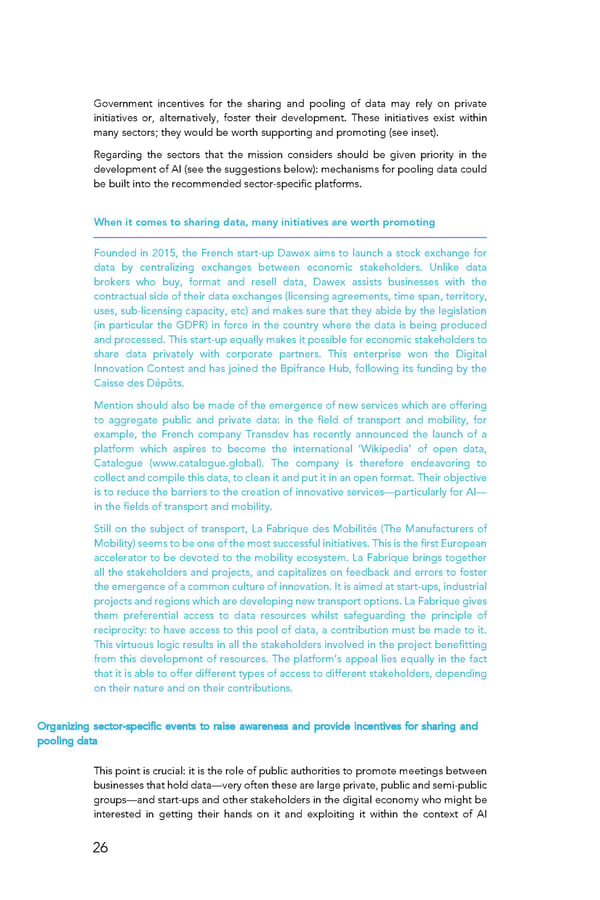Government incentives for the sharing and pooling of data may rely on private initiatives or, alternatively, foster their development. These initiatives exist within many sectors; they would be worth supporting and promoting (see inset). Regarding the sectors that the mission considers should be given priority in the development of AI (see the suggestions below): mechanisms for pooling data could be built into the recommended sector-specific platforms. When it comes to sharing data, many initiatives are worth promoting Founded in 2015, the French start-up Dawex aims to launch a stock exchange for data by centralizing exchanges between economic stakeholders. Unlike data brokers who buy, format and resell data, Dawex assists businesses with the contractual side of their data exchanges (licensing agreements, time span, territory, uses, sub-licensing capacity, etc) and makes sure that they abide by the legislation (in particular the GDPR) in force in the country where the data is being produced and processed. This start-up equally makes it possible for economic stakeholders to share data privately with corporate partners. This enterprise won the Digital Innovation Contest and has joined the Bpifrance Hub, following its funding by the Caisse des Dépôts. Mention should also be made of the emergence of new services which are offering to aggregate public and private data: in the field of transport and mobility, for example, the French company Transdev has recently announced the launch of a platform which aspires to become the international ‘Wikipedia’ of open data, Catalogue (www.catalogue.global). The company is therefore endeavoring to collect and compile this data, to clean it and put it in an open format. Their objective is to reduce the barriers to the creation of innovative services—particularly for AI— in the fields of transport and mobility. Still on the subject of transport, La Fabrique des Mobilités (The Manufacturers of Mobility) seems to be one of the most successful initiatives. This is the first European accelerator to be devoted to the mobility ecosystem. La Fabrique brings together all the stakeholders and projects, and capitalizes on feedback and errors to foster the emergence of a common culture of innovation. It is aimed at start-ups, industrial projects and regions which are developing new transport options. La Fabrique gives them preferential access to data resources whilst safeguarding the principle of reciprocity: to have access to this pool of data, a contribution must be made to it. This virtuous logic results in all the stakeholders involved in the project benefitting from this development of resources. The platform’s appeal lies equally in the fact that it is able to offer different types of access to different stakeholders, depending on their nature and on their contributions. Organizing sector-specific events to raise awareness and provide incentives for sharing and pooling data This point is crucial: it is the role of public authorities to promote meetings between businesses that hold data—very often these are large private, public and semi-public groups—and start-ups and other stakeholders in the digital economy who might be interested in getting their hands on it and exploiting it within the context of AI 26
 For a Meaningful AI - Report Page 26 Page 28
For a Meaningful AI - Report Page 26 Page 28